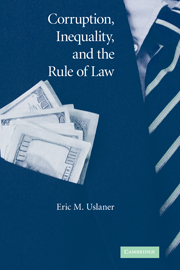Book contents
- Frontmatter
- Contents
- Preface
- 1 Corruption: The Basic Story
- 2 Corruption and the Inequality Trap
- 3 Corruption, Inequality, and Trust: The Linkages Across Nations
- 4 Transition and the Road to the Inequality Trap
- 5 The Rocky Road to Transition: The Case of Romania
- 6 Half Empty or Almost Full?: Mass and Elite Perceptions of Corruption in Estonia, Slovakia, and Romania
- 7 The Easy and Hard Cases: Africa and Singapore and Hong Kong
- 8 Corruption Isn't Inevitable, But …
- 9 Conclusions
- Appendix
- References
- Index
7 - The Easy and Hard Cases: Africa and Singapore and Hong Kong
Published online by Cambridge University Press: 27 July 2009
- Frontmatter
- Contents
- Preface
- 1 Corruption: The Basic Story
- 2 Corruption and the Inequality Trap
- 3 Corruption, Inequality, and Trust: The Linkages Across Nations
- 4 Transition and the Road to the Inequality Trap
- 5 The Rocky Road to Transition: The Case of Romania
- 6 Half Empty or Almost Full?: Mass and Elite Perceptions of Corruption in Estonia, Slovakia, and Romania
- 7 The Easy and Hard Cases: Africa and Singapore and Hong Kong
- 8 Corruption Isn't Inevitable, But …
- 9 Conclusions
- Appendix
- References
- Index
Summary
Now those among you full of pious teaching
Who teach us to renounce the major sins,
Should know before you do your heavy preaching:
Our middle's empty, there it all begins.
Your vices and our virtues are so dear to you.
So learn the simple truth from this our song.
Wherever you aspire, whatever you may do,
First feed the face and then talk right and wrong.
From “How to Survive,” Berthold Brecht and Kurt Weill, The Threepenny OperaThe transition countries pose a challenge for the idea of an inequality trap. They rank high on corruption, low on generalized trust, but comparatively low on inequality – though income disparities have been rising, often sharply, in almost all of these countries. Despite this “challenge,” I have generally found support for my argument linking perceptions of inequality, low trust, and high levels of grand corruption in transition countries. Especially in Romania, where perceptions of inequality are widespread and lead to demands for redistribution of wealth, the inequality trap argument receives strong support.
How well does the inequality trap account fare in a setting where all three conditions – high corruption, high inequality, and low out-group trust – all hold? African states largely, though hardly universally, meet all three conditions: high levels of corruption and inequality and low generalized trust. Such settings might qualify as a critical test of the framework. Strong support for the argument would bolster my account significantly while negative results would call it into question.
- Type
- Chapter
- Information
- Corruption, Inequality, and the Rule of LawThe Bulging Pocket Makes the Easy Life, pp. 180 - 213Publisher: Cambridge University PressPrint publication year: 2008



